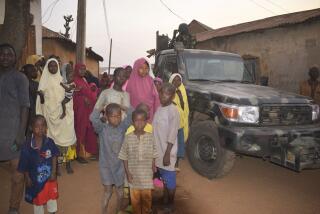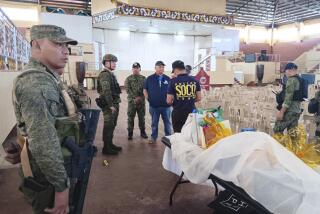Bomb at Nigerian market kills as many as 45; Boko Haram blamed
Almost daily bomb attacks in northeastern Nigeria -- the latest a bombing in a market in the town of Jimeta in Adamawa state that killed as many as 45 -- seem designed to send an ominous message to new President Muhammadu Buhari: Boko Haram is not going away.
Buhari has made Boko Haram’s defeat his top priority, but the continued bombings by the terror group underscore how difficult it is for an unwieldy, often ineffectual military force such as Nigeria’s army to prevent ruthless bomb attacks on soft civilian targets by a nimble terrorist group.
More than 60 people have been killed in attacks in the week since he took office.
In Thursday night’s attack in Jimeta, a bomb was left at a market, in a tricycle taxi, the main means of taxi transport in the northeast. Though no one has claimed responsibility for the blast, it resembles previous attacks by Boko Haram, which has left bombs in taxis and cars in public places before.
The attack at the Jimeta night market came shortly after an attack by a female suicide bomber at a checkpoint in Maiduguri, which killed two.
Authorities said the Jimeta death toll was 45, with anouther 40 injured, while other reports put the death toll at 31.
Buhari has announced that the military’s command center will be moved from the comfort of the capital, Abuja, to the uncomfortable front line city of Maiduguri, in the northwest, saying the battle against Boko Haram couldn’t be won from distant Abuja.
He has also visited his counterparts in neighboring Chad and Niger, his first foreign trips as president, sending a strong message of greater regional unity in the fight against the terror group.
Buhari also vowed to leave no stone unturned in investigating allegations this week by Amnesty International that the Nigerian military and security forces were responsible for the deaths of more than 8,000 men and boys who were suspected of Boko Haram involvement. About 1,200 were shot down in the street or in captivity while an additional 7,000 who were detained died in horrendous conditions involving denial of water and food for days, and torture, according to the rights group.
Critics say abuses by the Nigerian security forces have fueled support for Boko Haram.
More to Read
Start your day right
Sign up for Essential California for news, features and recommendations from the L.A. Times and beyond in your inbox six days a week.
You may occasionally receive promotional content from the Los Angeles Times.






